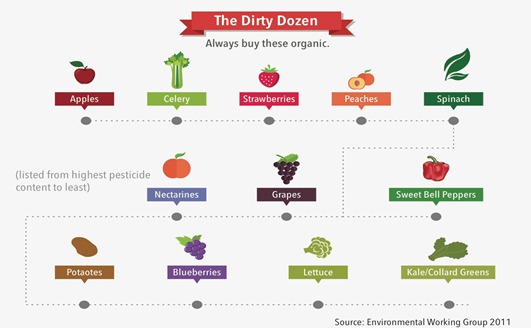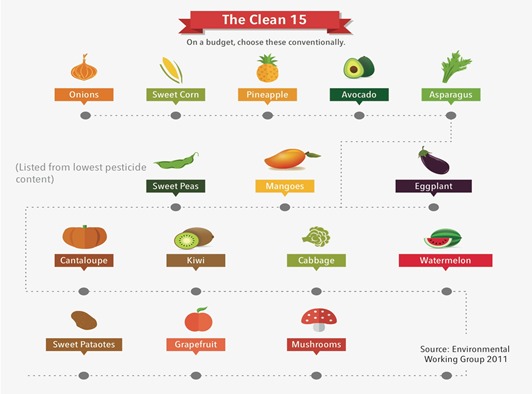Where possible it is always good to try to buy locally grown produce as it will be fresher and have a higher nutrient content. Local produce from farmers markets is typically cheaper than supermarket produce and avoids excessive food miles whilst supporting your local farmers.
Whilst it’s preferable to buy organic produce as it contains higher levels of antioxidants and will contribute far less to your toxic load, we appreciate it’s not always possible and can be expensive. So, if you want to eat organic food, but can’t afford to buy everything organic prioritising the ‘Dirty Dozen’ is a good place to start.
The Dirty Dozen: Always buy these organic
If you can afford to buy some organic fruit and vegetables, this is probably the best place to start. This list contains the fruit and veg that contains the worst levels of pesticide. The highest are listed first:
- Apples
- Celery
- Strawberries
- Peaches
- Spinach
- Sweet peppers
- Grapes
- Nectarines
- Potatoes
- Blueberries
- Lettuce
- Kale / collard greens

The Clean 15: On a budget? These don’t need to be organic
If you can’t afford to buy too much in the way of organic fruit and vegetables, don’t worry about these. Listed from the lowest pesticide content:
- Onions
- Sweetcorn
- Pineapple
- Avocado
- Asparagus
- Aubergine
- Mangoes
- Peas
- Cantaloupe
- Kiwi
- Cabbage
- Watermelon
- Mushrooms
- Grapefruit
- Sweet potato

Grass-fed meats, eggs, and dairy
Grass-fed animals are free of hormones, antibiotics, pesticides like organic foods. Additionally, they get plenty of sunlight, access to fields and they are not fed corn and soy. This makes them rich in fat-soluble vitamins (A, D, E, and K) and fatty acids, such as omega-3 fatty acids and CLA. They also have less cholesterol and inflammatory fats.
See Foundations of a healthy diet: part one, Foundations of a healthy diet: part two for more information about the nutrients you need in pregnancy.
Information provided by specialist nutritional therapist: Rosie Letts Nutrition.
Content Disclaimer
The information contained above is provided for information purposes only. The contents of this article are not intended to amount to advice, and you should not rely on any of the contents of this article. Professional advice should be obtained before taking or refraining from taking any action as a result of the contents of this article. New Life Classes disclaims all liability and responsibility arising from any reliance placed on any of the contents of this article.


